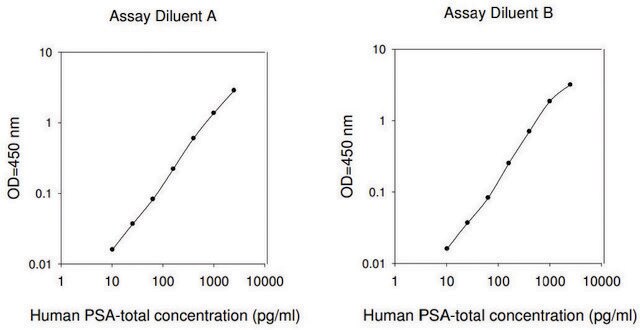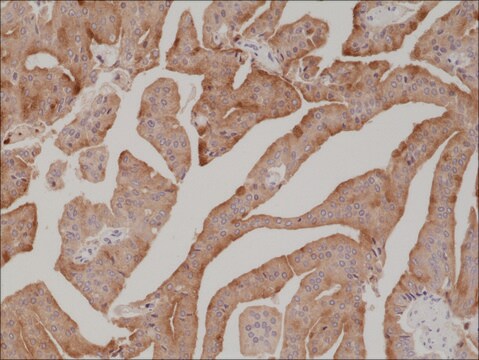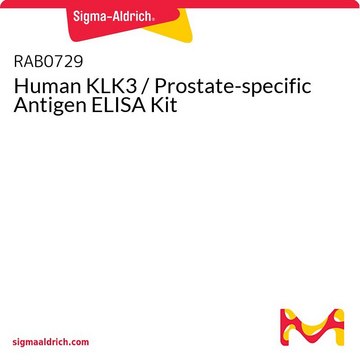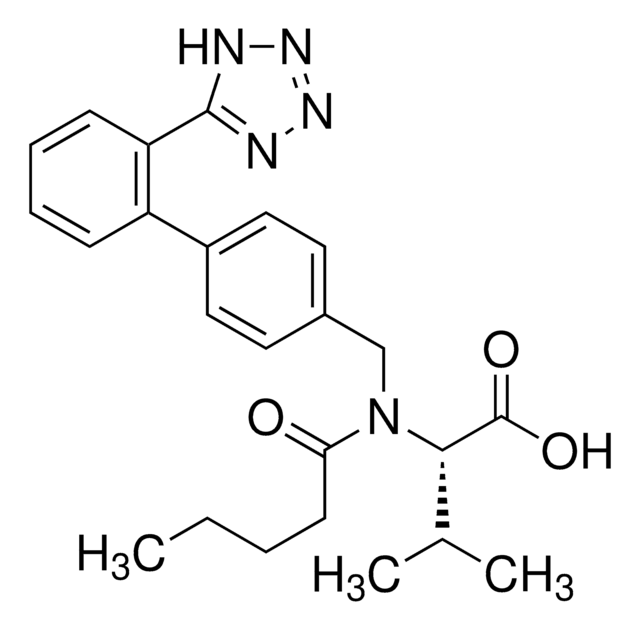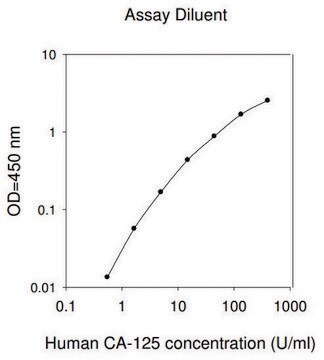P3338
Prostate Specific Antigen from human semen
buffered aqueous solution
Sinónimos:
Cancer-associated PSA, PSA
Iniciar sesiónpara Ver la Fijación de precios por contrato y de la organización
About This Item
Productos recomendados
¿Está buscando productos similares? Visita Guía de comparación de productos
General description
Prostate specific antigen (PSA) is a 28.43 kDa single-chain glycoprotein containing 237 amino acids, encoded by the kallikrein gene mapped to human chromosome 19. It is specifically expressed by human prostate tissue and is one of the highly abundant proteolytic enzyme expressed in the seminal fluid.
Application
Prostate Specific Antigen from human semen has been used:
- in microarray sandwich assay
- in the preparation of sandwich immunosensor
- as a target protein to test composite organic−inorganic nanoparticle (COIN) and Alexa conjugates in a plate-binding assay
Biochem/physiol Actions
Glycoprotein of the glandular kallikrein family
Prostate Specific Antigen (PSA), a glycoprotein of the glandular kallikrein family, is a serine protease with chymotrypsin-like enzymatic activity. Circulating PSA exists in free and protease inhibitor-bound forms. Studying the ratios of free to inhibitor-bound forms may prove valuable in the diagnosis of prostate cancer.
Prostate-specific antigen (PSA) is an androgen-regulated serine protease specifically produced by prostatic tissue and is secreted into the lumen. PSA in semen cleaves semenogelins present in the seminal coagulum. Total PSA levels are increased in serum of prostate cancer (PCa) patients. PSA functions as a potential biomarker for PCa. Serum protease inhibitors such as α1-antichymotrypsin (α1-ACT), α2-macroglobulin (α2-M), and other acute-phase proteins form irreversible complexes with circulating PSA and hinder proteolytic activity of PSA.
Packaging
Package size based on protein content
Quality
Highly purified
Physical form
Solution in phosphate buffered saline, contains 0.05-0.1% sodium azide with 50% glycerol
Storage Class
12 - Non Combustible Liquids
wgk_germany
WGK 2
flash_point_f
Not applicable
flash_point_c
Not applicable
Elija entre una de las versiones más recientes:
¿Ya tiene este producto?
Encuentre la documentación para los productos que ha comprado recientemente en la Biblioteca de documentos.
Microarray-based multiplexed scanometric immunoassay for protein cancer markers using gold nanoparticle probes.
Kim D
Analytical Chemistry, 81(21), 183-187 (2009)
Barry Lutz et al.
The journal of histochemistry and cytochemistry : official journal of the Histochemistry Society, 56(4), 371-379 (2007-12-12)
Surface-enhanced Raman scattering (SERS) nanoparticles are emerging as a new approach for optical detection of biomolecules. In a model assay in formalin-fixed paraffin-embedded (FFPE) prostate tissue sections, we detect prostate-specific antigen (PSA) using antibody (Ab) conjugated to composite organic-inorganic nanoparticles
Raman nanoparticle probes for antibody-based protein detection in tissues
Lutz B, et al.
The journal of histochemistry and cytochemistry : official journal of the Histochemistry Society, 56(4), 371-379 (2008)
Usefulness of total PSA value in prostate diseases diagnosis
Prcic A, et al.
Acta Informatica Medica, 24(3), 156-156 (2016)
A M Zhou et al.
Clinical chemistry, 39(12), 2483-2491 (1993-12-01)
Prostate-specific antigen (PSA) in serum is primarily complexed with alpha 1-antichymotrypsin (alpha 1-ACT). However, 12-15% of prostate cancer (PCa) patients present with the predominant form being uncomplexed (free) PSA (Lilja et al., Clin Chem 1991;37:1618-24). We report that commercial immunoassays
Nuestro equipo de científicos tiene experiencia en todas las áreas de investigación: Ciencias de la vida, Ciencia de los materiales, Síntesis química, Cromatografía, Analítica y muchas otras.
Póngase en contacto con el Servicio técnico
